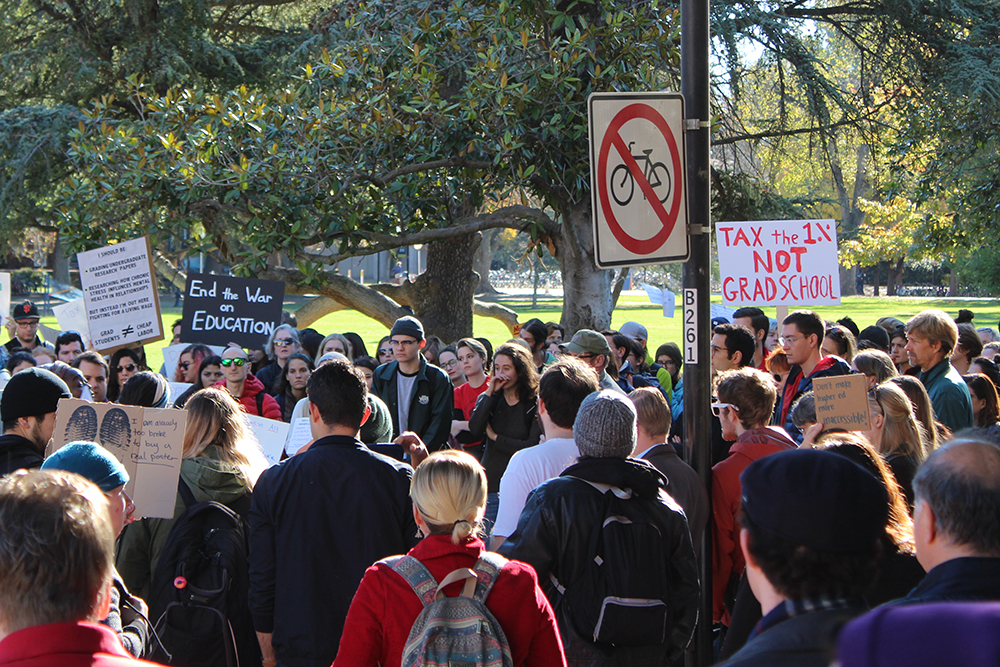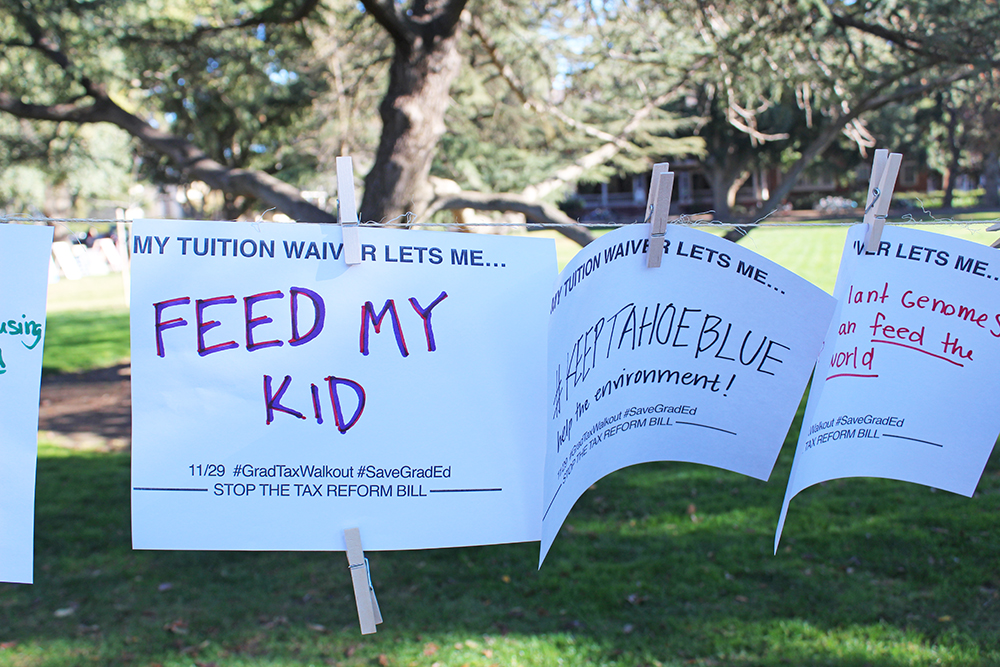Nicole Freeling, UC Newsroom
With tax reform at the top of the congressional agenda, University of California students and leaders are pushing back against proposed provisions that could leave some graduate students shouldering a tax bill so big they could be forced out of school or decide not to enroll at all.
Taxes would increase by more than 30 percent for many UC graduate students if the current House proposal is enacted – and some could see their liability soar by a whopping 400 percent. Even for those facing less drastic hikes, the increase could be enough to threaten their continued studies.
At issue is a proposed change to the tax code that would require graduate students to pay taxes on a tuition benefit that is currently covered as part of their funding package for graduate school – a dollar value that in some cases far exceeds the modest stipends they receive to pursue their research.
Roughly 23,000 of UC’s 54,000 graduate students receive these “qualified tuition reductions,” which cover the cost of their graduate education while they work for the university as research and teaching assistants.
The House bill would treat these tuition reductions as taxable income, in some cases pushing students living on modest stipends into tax brackets usually associated with much wealthier households.
Higher education leaders say the resulting squeeze could affect not only graduate students – who are a key part of a university’s research and teaching enterprise – but research and higher education more broadly.
Bracing for a huge hit
UC San Diego graduate student Stosh Ozog could see his tax bill soar by thousands of dollars. A joint MD/Ph.D. student, Ozog is studying gene therapy to cure and potentially prevent HIV.
His wife, Miriam Rubenson, is a USC psychology grad student studying interventions to reduce mental health problems and delinquency among juvenile offenders. The newly-married couple both work as teaching assistants and serve in local clinics for the poor and underserved. For their research, teaching and service, they each receive stipends of just over $30,000.

Ph.D. students Stosh Ozog and Miriam Rubensen could face a $20,000 tax bill on a $60,000 household income.
Photo courtesy Stosh Ozog
Under the House-passed bill, their taxable income would be calculated to include their stipend, as well as the tuition remission benefit: $50,000, for Rubenson, and as much as $45,000 for Ozog, when he enters the medical school portion of his program.
“We would be taxed, not on our income of just over $60,000, but on incomes of upwards of $160,000,” said Rubenson. “We’re looking at a tax bill of $20,000 a year – a third of our total income.”
The way the House bill is written would cause wide disparity in the taxes that students are liable for, even among those in similar departments and lines of research. The mix of funding students receive for their study would play a big role, as some forms of funding, such as fellowships and scholarships, are shielded from taxes.
The sticker price of students’ tuition would also be a factor, with students at more costly private schools and those who pay out-of-state tuition hit the hardest. UC Berkeley Ph.D. student Vetri Velan, who studies particle physics, and Kathy Shield, who studies nuclear engineering, have created a calculator to help students gauge how the proposed change would impact them.
Richard Prince, a UC Irvine graduate student, who has dreamed of being a scientist since he was a five-year-old, said the hike could force him to shelve those plans – along with years of federally-funded research.
Prince, who comes from a low-income family (his mom was a worker in the Pringles factory), is two years from completing a Ph.D. in biomedical engineering for work using laser optics as a means of pinpointing the source of disease. He would see his tax liability double, increasing by about $2,000 a year.
“That may seem like not much money, but for someone from a working-class family, it would probably mean I would have to leave school,” he said.
The National Science Foundation-funded researcher says he is the only one in his lab who is trained in his particular area of focus. “If I leave, that research just stops,” he said. “That’s thousands of dollars of lab equipment that goes unused and hundreds of thousands of dollars of federally-funded research that goes unfinished.”

Photo courtesy Roy Taggueg, UC Davis
Call to action
The provision in the House bill is one of the proposals making its way through Congress that UC President Janet Napolitano and student leaders have said will have a disproportionate impact on students.
Beyond the risk of repealing critical higher education tax benefits, university leaders say the reform proposals have serious implications for the financial stability of higher education institutions as they pertain to charitable giving, tax-exempt bond financing and unrelated business income taxation – among other provisions – all of which play crucial roles in UC’s ability to carry out its education, research, health care and public service missions. University leaders fear these could threaten the overall affordability and accessibility of higher education, limiting universities’ abilities to serve as engines of innovation and economic growth, according to an analysis conducted by the university.
“Tax reform should not be borne on the backs of our hardworking graduate students,” Napolitano said in a joint statement issued Nov. 27 with Student Regent Paul Monge and Student Regent-designate Devon Graves.
“Repeal of long-established tax benefits, from tuition waivers to loan-debt relief, will threaten the affordability and accessibility of higher education for so many students and families.”
University of California leaders, in a letter to supporters this week, urged people to call their members of Congress and make their concerns known. Along with letters and calls, students across the country staged a national protest on Wednesday to pressure Congress to drop the proposed changes.
If an increased tax burden forces students to leave their studies and discourages new students from applying, that could profoundly affect how universities function.
In the lab, researchers do much of the day to day work that moves research forward. They are responsible for a major part of the thousands of new inventions, patents and start-ups that emerge from the university each year.
Graduate students also play a vital role in the classroom, where they serve as instructors and teaching assistants for undergraduate students.

“I’m just calling and praying and hoping this doesn’t go through, because I don’t really have a Plan B,” said UC San Diego sociology graduate student Carolina Mayes.
As part of her funding, Mayes has her tuition covered and gets a $21,000 stipend for living expenses. In exchange, she serves as a teaching assistant.
She leads the discussion section of a large sociology lecture class, providing students with the individualized attention they wouldn’t otherwise get. She also assists with grading papers.
“I probably grade about 50 papers a week,” she said.
Under the House bill, her tax liability would double from just under $1,000 to close to $3,000. She is reluctant to accumulate more student loan debt, which would also balloon under the current House tax plan.
“If this passes it will obliterate my chances of finishing my study,” she said. “I just can’t find housing in the San Diego area on any less income than I already have.”
A threat to critical research
Many fear that the bill, if enacted, will essentially put graduate school out of reach for all but the very wealthiest students.
Ozog is committed to finding the money through loans and other means to stick it through to complete his research – but many of his peers say they will drop out.
“They are working on diseases like cancer, malaria, ALS. They could make a lot more money doing things that are a lot less important,” Ozog said. “We are trying to tackle some of the biggest issues facing society,” he said. “Putting a tax on doing this work sends a chilling message about how much it’s valued.”

